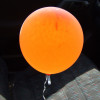Teaching cows to use the toilet
Interview with
牛,这些天,得到的一个环境lly bad rap, and that’s partly thanks to the methane they produce during digestion that contributes to greenhouse gas emissions. But scientists and farmers also have a problem with something else they generate a lot of: nitrogen-rich urine. And the issue is that they dispense too much of it in one go in one place. But now there might be an answer: toilet-training for cows! Eva Higginbotham spoke to lead author Lindsay Matthews from the University of Auckland...
Lindsay - Cows produce a lot of urine, you know, 20, 30 liters a day each
Eva - Uh, 20 to 30 litres a day of urine is an absolutely amazing amount! Do they just drink tons of water?
Lindsay - Well, they do, yes. You know, they're producing a lot of milk, they're eating a lot of food and they need to drink a lot of water. So they're drinking over a hundred litres of water each a day. It has to go somewhere! And it comes out in great gushes that the soil and the plants can't handle, so the nitrate in the urine gets converted into two polluting products in outdoor settings - so you get the nitrate going through to the water, and you get the nitrate in the soil getting converted to nitrous oxide which is a really potent greenhouse gas. If you're in an indoor situation, you get the urine mixing with faeces and converting immediately to ammonia, which is also a problem for the animals and the environment.
Eva - And so you were trying to find a solution to what to do with all of this urine?
Lindsay - Yeah. So it occurred to us that if we could collect it at source, we could deal with it in an environmentally-friendly way. The nutrients could be reused, they're very good nutrients, it's just not in the quantity that they come out at in a small area. So the idea is to collect the urine, how do we do that? Well, the most obvious solution is to use a toilet. The only problem is that people in the past have tried to toilet train cattle, and haven't really had that much success. So this is what we were faced with as our solution.
Eva - What did you do?
林赛-我们模仿训练what you might do with a toddler, and one of the successful ways of toilet training toddlers is to put them on the toilet. So we had our metaphorical toilet, which was really just a wee room, and it obviously had to be clearly different from anything else otherwise it would be just another part of the barn. So it was green walls, green floor - AstroTurf floor, so not a concrete floor, it had a nice spongy floor. The other thing that was different about it is that if they urinated in there, they immediately got a reward. This was really the first exciting part of the training, is that they made that connection between the urination and the reward so quickly. You know, some of them within two or three urinations they were spinning around and waiting at the hopper for their little tasty treat of liquid molasses. Others took maybe five to ten urinations, but regardless, most of the animals learned this phase very quickly. The other challenge in taking it to application will be the training, and we think that needs to be automated because even though it's relatively quick, you need to be there to observe the animal if you're doing it manually. So we would have a system for automatically detecting urinations and linking that to an automatic delivery of reward. We see that as less of a challenging part of the process
Eva - It's like a robotic toilet trainer for cows
Lindsay - Exactly. Exactly.
Eva - And now that you've trained cows to use a toilet, do you think you could train them to do anything?
Lindsay - Well, within their physical capabilities? Yes. They've got way more ability than a lot of people think they have. And the speed of learning of this rather complex task in interrogating their own feelings, and bladder filling, and then responding appropriately, voluntarily controlling reflexes...that's massive. And so, yeah, we've got a lot of potential




Comments
Add a comment